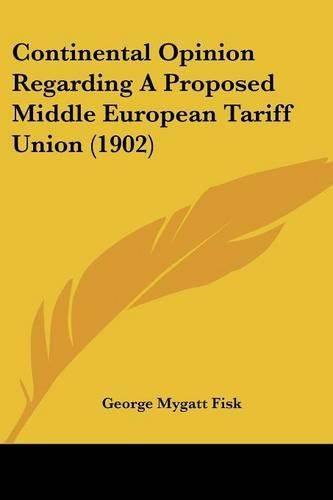Readings Newsletter
Become a Readings Member to make your shopping experience even easier.
Sign in or sign up for free!
You’re not far away from qualifying for FREE standard shipping within Australia
You’ve qualified for FREE standard shipping within Australia
The cart is loading…






Purchase of this book includes free trial access to www.million-books.com where you can read more than a million books for free. This is an OCR edition with typos. Excerpt from book: CONTINENTAL OPINION REGARDING A PROPOSED MIDDLE EUROPEAN TARIFF-UNION In the European press, more especially in that of Germany, one often meets with the expression
Middle European Zollverein. A study of its content reveals the existence of a movement – more academic than political – contemplating,, for one reason or another, greater unity of action on the part of certain European countries, primarily Germany and Austria-Hungary. The purpose of this article will be to describe this movement and set forth European opinion with reference to a subject whose possible realization might be fraught with . enormous economic consequences to the United States. The tendencies which operated to make of England and France modern states were counteracted in the countries to the east – primarily Germany and Austria – by other forces. Unity, however, among the states of middle Europe is not a new idea. It existed for centuries under the name of the
Holy Roman Empire. This fiction ceased in 1806, and in 1815, after the Napoleonic wars, there was formed in its stead the
Germanic Confederation
which lasted until 1866. This governmental organization had no real power but all the weaknesses which characterized the Government of the United States under the
Articles of Confederation. Almost contemporaneously with its inception there was formed in Prussia in 1818 an economic measure known as the
Zollverein. Beginning with Prussia this Verein gradually absorbed other German states so that by 1834, when it assumed thename of the German Zollverein, it included practically all the German states excepting Austria and Hanover. This exclusion of Austria brings us to the first chapter in the consideration of a
Middle European Zollverein, using this term in its modern acc…
$9.00 standard shipping within Australia
FREE standard shipping within Australia for orders over $100.00
Express & International shipping calculated at checkout
Purchase of this book includes free trial access to www.million-books.com where you can read more than a million books for free. This is an OCR edition with typos. Excerpt from book: CONTINENTAL OPINION REGARDING A PROPOSED MIDDLE EUROPEAN TARIFF-UNION In the European press, more especially in that of Germany, one often meets with the expression
Middle European Zollverein. A study of its content reveals the existence of a movement – more academic than political – contemplating,, for one reason or another, greater unity of action on the part of certain European countries, primarily Germany and Austria-Hungary. The purpose of this article will be to describe this movement and set forth European opinion with reference to a subject whose possible realization might be fraught with . enormous economic consequences to the United States. The tendencies which operated to make of England and France modern states were counteracted in the countries to the east – primarily Germany and Austria – by other forces. Unity, however, among the states of middle Europe is not a new idea. It existed for centuries under the name of the
Holy Roman Empire. This fiction ceased in 1806, and in 1815, after the Napoleonic wars, there was formed in its stead the
Germanic Confederation
which lasted until 1866. This governmental organization had no real power but all the weaknesses which characterized the Government of the United States under the
Articles of Confederation. Almost contemporaneously with its inception there was formed in Prussia in 1818 an economic measure known as the
Zollverein. Beginning with Prussia this Verein gradually absorbed other German states so that by 1834, when it assumed thename of the German Zollverein, it included practically all the German states excepting Austria and Hanover. This exclusion of Austria brings us to the first chapter in the consideration of a
Middle European Zollverein, using this term in its modern acc…